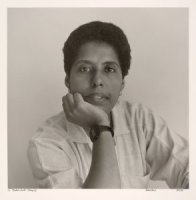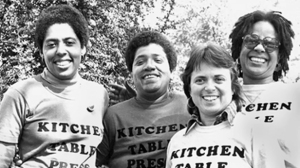On Identity Politics
 “Building identity politics gave us a platform, an analysis, and a certain sense of confidence that we deserved to be part of the dialogue. If we had not done that, where would women of color be, as far as being able to assert the legitimacy of our concerns and the particularity of our point of view?”
“Building identity politics gave us a platform, an analysis, and a certain sense of confidence that we deserved to be part of the dialogue. If we had not done that, where would women of color be, as far as being able to assert the legitimacy of our concerns and the particularity of our point of view?”
(Barbara Smith in conversation with Virginia Eubanks, p. 44)
Barbara and her colleagues in the Combahee River Collective are credited with originating the term “identity politics,” defining it as an inclusive political analysis for contesting the interlocking oppressions of race, gender, class and sexuality. Now widely referred to as “intersectionality,” this analytical approach has shaped scholarship, teaching, and progressive activism. Barbara’s work has been a source of guidance and inspiration to individuals and movements committed to battling both external and internal oppression.
On Defining the Discipline of Black Women’s Studies
“Black feminist organizing built a political environment in which one could assert the importance of [Black women’s] work and not necessarily just lose everything—one’s sanity, one’s job, one’s status, one’s credibility. We were building a real life context in which Black women could, if not be free, at least be free to express what we needed to express.”
(Barbara Smith in conversation with Beverly Guy-Sheftall, p. 111)
Barbara Smith was a leader in defining and establishing the field of Black women’s studies in the United States. She published work that introduced for the first time close textual analysis of Black fiction that included gender and sexuality as an analytical lens. Her groundbreaking 1977 essay, “Toward a Black Feminist Criticism,” opened the door to serious critical consideration of Black women writers. From 1975 through 1978 Barbara served as a member of the Modern Language Association Commission on the Status of Women in the Profession where she had a national impact upon the creation of new courses and curricula focused on the previously neglected work of Black women authors, such as Zora Neale Hurston, Nella Larsen, and Ann Petry.
On Being an Independent Book Publisher
 “Starting a press for women of color in 1980 may have defied logic, but it was one of those acts of courage which characterize Third World women’s lives. . . . Given the odds, why were we so strongly motivated to attempt the impossible? An early slogan of the women in print movement was ‘freedom of the press belongs to those who own the press.’ This is even truer for multiply disenfranchised women of color who have minimal access to power, including the power of media, except that which we wrest from an unwilling system.”
“Starting a press for women of color in 1980 may have defied logic, but it was one of those acts of courage which characterize Third World women’s lives. . . . Given the odds, why were we so strongly motivated to attempt the impossible? An early slogan of the women in print movement was ‘freedom of the press belongs to those who own the press.’ This is even truer for multiply disenfranchised women of color who have minimal access to power, including the power of media, except that which we wrest from an unwilling system.”
(Barbara Smith, “A Press of Our Own: Kitchen Table: Women of Color Press,” pp. 153, 154)
Barbara continued to break new ground as the publisher of Kitchen Table: Women of Color Press. She co-founded one of the first independent presses in the country committed to publishing the writing of women of color. In addition, several volumes edited or co-edited by Barbara became foundational texts in the areas of feminist scholarship and Black women’s studies. These anthologies made available new and difficult to find writing that shaped the landscape of the emerging field of Black Women’s Studies.
On Being an Elected Official
“How can I stick it to the man, if I am the man? This is a most peculiar place for an unreconstructed sixties radical to be, but running for office just seemed like the next logical thing to do. . . . Every single day I find myself making delicate calibrations about how to move forward to get something accomplished, to be effective, to honor relationships, and to maintain my principles. It is extremely challenging work. I feel in some ways that being in this position is the ultimate test of my Black Feminist politics.”
(Barbara Smith, “Black Feminist Activism: My Next Chapter,” p. 213)
Barbara’s efforts have ushered in a series of electoral firsts – first African American District Attorney of Albany County and first female Mayor of the City of Albany. Both were insurgent campaigns against a deeply entrenched Democratic political machine. Her own election to public office, representing her neighborhood in the local Common Council, was also an insurgent candidacy that marked a decisive shift from grassroots activist to elected official, though one who remained on the margins as a member of the progressive caucus which maintained its independence from the longtime incumbent mayor. This new position brought paradoxes and challenges.
On Innovative Urban Policy
“The most important thing is to create opportunities for people to access the things that will help them improve their lives. People in inner-city neighborhoods who suffer under institutionalized inequality should get to define what’s important and move on it.”
(Barbara Smith in conversation with Virginia Eubanks, p. 238)
Barbara has shown leadership in coalitions to end poverty and violence in the city of Albany, New York and beyond. Her partnerships have brought national programs, initiatives and funding to Albany to alter the structure of opportunity in the city. Albany’s anti-gun violence initiative is modeled upon Chicago’s nationally acclaimed CeaseFire anti-violence program (now known as Cure Violence). Barbara has also prioritized working to ensure that all children in Albany have access to a high quality education and introduced elements of the Harlem Children’s Zone model to Albany. As chair of the Common Council’s Public Safety Committee, Barbara helped to establish community policing in Albany. She currently works with the new mayor’s administration to establish and implement Albany’s Equity Agenda which utilizes innovative approaches to address poverty, joblessness, racial disparities, and other types of marginalization. Mayor’s office to bring innovative approaches to economic development initiatives to end poverty and joblessness.
